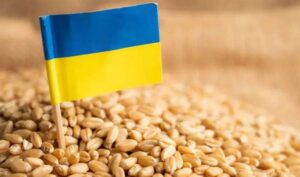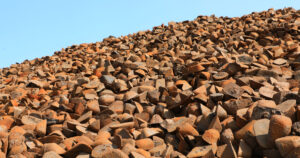
In 2024, Agrotrade agricultural holding exported more than 450 thsd tonnes of grain, of which the share of its own agricultural products amounted to 230 thsd tonnes, and third-party producers – 227 thsd tonnes, the press service of the agricultural holding reported.
According to the report, most of the grain was exported to Turkey, Italy, Spain, the Netherlands, and Belgium. A partnership project with other suppliers allowed the company to expand its geography: for the first time, it shipped 54.5 thsd tonnes of wheat to Bangladesh.
“2024 was one of the most difficult years for the Ukrainian agricultural sector. The main challenges included a reduction in grain production, difficulties in finding margins, as well as constant air alerts, power outages and destroyed transportation routes due to missile attacks. Sometimes we had to change our plans drastically: look for places to store grain or adapt logistics in a short time. However, even in such conditions, we remained flexible and fully fulfilled our obligations to our customers,” said Andriy But, Director of Foreign Economic Activity Department at Agrotrade.
The agricultural holding specified that in 2024, corn and wheat were in the highest demand on the global market.
The active period of the grain trading season will end earlier – in April-May 2025. This is due to a drop in yields and a decrease in grain stocks over the past years, Agrotrade predicts.
The Agrotrade Group is a vertically integrated holding company with a full agro-industrial cycle (production, processing, storage and trade of agricultural products). It cultivates over 70 thousand hectares of land in Chernihiv, Sumy, Poltava and Kharkiv regions. Its main crops are sunflower, corn, winter wheat, soybeans and rapeseed. It has its own network of elevators with a simultaneous storage capacity of 570 thousand tons.
The group also produces hybrid seeds of corn and sunflower, barley, and winter wheat. In 2014, a seed plant with a capacity of 20 thousand tons of seeds per year was built on the basis of Kolos seed farm (Kharkiv region). In 2018, Agrotrade launched its own brand Agroseeds on the market.
Vsevolod Kozhemiako is the founder and CEO of Agrotrade.

US President Donald Trump has lifted the moratorium on the issuance of new liquefied natural gas (LNG) export licenses imposed by his predecessor Joe Biden. The US Department of Energy reported that it is returning to the normal regime of reviewing export applications in accordance with Trump’s order.
“The Department has been instructed to resume reviewing applications for the export of US LNG to countries that do not have a free trade agreement with the United States. The proper review of export applications is required by law and must be carried out accordingly,” the Energy Ministry said in a statement.
In December, the agency published the results of a study on LNG exports and set February 18 as the deadline for public comments on it. Now the Ministry of Energy has decided to extend the comment period until March 20, 2025.
Earlier, the Experts Club think tank, Brian Mefford and Maxim Urakin, released a video analysis on what changes are expected to occur in US domestic and foreign policy under Trump, the video is available on the Experts Club YouTube channel – https://youtu.be/W2elNY1xczM?si=MM-QjSqGce4Tlq6T
EXPERTS CLUB, EXPORT, GAS, LICENSE, MORATORIUM, TRUMP, URAKIN, Меффорд

As of January 15, Ukraine exported 23.616 mln tonnes of grains and pulses since the beginning of the 2024-2025 marketing year (July 2024 – June 2025), of which 1.388 mln tonnes were shipped this month, the press service of the Ministry of Agrarian Policy and Food reported, citing the data of the State Customs Service of Ukraine.
According to the report, as of the same date last year, the total shipments amounted to 20.563 million tons, including 2.097 million tons in January.
In terms of crops, since the beginning of the current season, Ukraine has exported 10.326 million tons of wheat (413 thousand tons in January), 2.008 million tons of barley (9 thousand tons), 10.8 thousand tons of rye (0), and 10.868 million tons of corn (959 thousand tons).
The total export of Ukrainian flour since the beginning of the season as of January 15 is estimated at 39.4 thsd tonnes (1.8 thsd tonnes in January), including 36.1 thsd tonnes of wheat (1.6 thsd tonnes).

Despite the temporary occupation of part of the agricultural land by the enemy, Ukraine demonstrated good results in the agricultural sector in 2024 and was able to return the historical ways of agricultural exports, and therefore offers the Portuguese Republic to strengthen cooperation, said Vitalii Koval, Minister of Agrarian Policy and Food, at an online meeting with José Manuel Fernandes, Minister of Agriculture and Fisheries of Portugal.
“In 2024, 57% of Ukraine’s agricultural exports went to the EU countries. In total, Ukraine exported agricultural products worth $24.6 billion, including $211.6 million to Portugal,” the Ministry of Agrarian Policy’s press service quoted the minister as saying.
In addition, he emphasized that last year Ukraine returned to its historical ways of agricultural exports, as 86% of agricultural products are exported through Odesa and Danube ports. According to him, Ukraine is actively working to open new markets, particularly in Africa and the Middle East.
Koval urged his Portuguese counterpart to work together to combat the illegal sale of Ukrainian grain to Russia.
The Minister also thanked the people of Portugal for their consistent support of Ukraine and the President’s humanitarian initiative Grain From Ukraine.

In December 2024, the Export Credit Agency (ECA) supported UAH 311.47 million of exports, bringing the total to UAH 7.5 billion since the beginning of the year.
According to the ECA website, the largest number of loans for exporters in December were issued and insured by Vostok Bank (UAH 175 million), Ukreximbank (UAH 43.8 million), and PrivatBank (UAH 40.7 million).
Entrepreneurs in Odesa region (UAH 174.8 million), Dnipropetrovs’k region (UAH 174.8 million), and Zakarpattia region (UAH 43.8 million) were the most active users of ECA services.
In December, Ukrainian exporters planned to trade with Latvia, Poland, and Uzbekistan the most: they will supply grain and flour products, paper and cardboard products, and toys.
In December, the ECA insured a bank guarantee for exports of services for the first time. It was provided by Ukreximbank to the Ukrainian company C.E. Industry Group, which won a tender for the repair of mining equipment of the Polish state-owned company Polska Grupa Górnicza S.A. The contract amount is UAH 43.78 million (PLN 4.25 million), the guarantee amount is UAH 17 million, and the validity period is 13 months.
The Export Credit Agency was established to stimulate the export of goods (works, services) of Ukrainian origin and support exporters-residents of Ukraine through insurance, reinsurance, and guarantees under security contracts for export development. On January 7, 2023, the National Bank of Ukraine was authorized to regulate the activities of the ECA.

In 2024, Ukraine reduced exports of processed pig iron in physical terms by 3.4% compared to 2023, to 1 million 290.622 thousand tons.
According to statistics released by the State Customs Service (SCS), pig iron exports in monetary terms decreased by 6.1% to $500.341 million during the period under review.
At the same time, exports were carried out mainly to the United States (72.64% of supplies in monetary terms), Turkey (8.03%) and Italy (7.30%).
For the whole of 2024, the country imported 38 tons of pig iron worth $90 thousand from Germany (in January, March, May, June, July, August, October and November, there were no imports), while in the same period in 2023, it imported 154 tons of pig iron worth $156 thousand.
As reported, in 2023, Ukraine decreased exports of processed pig iron in physical terms by 5.8% compared to 2022 – to 1 million 248.512 thousand tons, while exports in monetary terms decreased by 26.2% to $471.467 million. Deliveries were made mainly to Poland (51.91% of supplies in monetary terms), Spain (21.41%) and the United States (13.15%).
In 2023, Ukraine imported 154 tons of pig iron worth $156 thousand from Germany (42.31%), Brazil (41.67%) and Poland (16.03%), compared to 40 tons of pig iron worth $23 thousand in 2022.